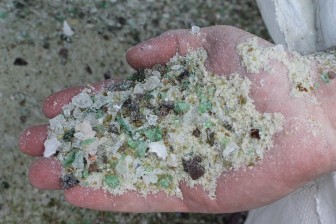Why Is It So Hard to Recycle Glass in Alabama?
Glass is a part of our daily lives. It’s in our refrigerators and our cabinets. We eat off it. We drink out of it. It’s everywhere. Everywhere but in our recycling bins, and that’s because the majority of waste services in Alabama don’t recycle glass.
But that’s not the case at the Alabama Environmental Council’s recycling center, where it’s a little noisier these days because of their new glass pulverizer. A mixture of glass, sand, and water travels along a 16-foot conveyor belt that carries it up and drops it into a large dumpster where it gets ground down.
“It crushes it down to a [less than] three-eighths-inch product, which is safe to touch, safe to walk on,” says Michael Churchman, Executive Director of the Alabama Environmental Council (AEC).
AEC, Greater Birmingham’s only glass recycler, had stopped taking glass in 2012 because the market for recycled glass had fallen, partly because its use in cement decreased. “[And that’s what] ultimately lead to us having to shut that operation down and look for a better way to make glass recycling work,” he continues.
But public demand for glass recycling remains steady. There’s an economic side to it that most people don’t understand, though. For example, says Churchman, there’s no market for recycled glass in Alabama. The AEC, which resumed taking glass this spring, charges a fee that helps cover the cost to ship it out of state. Most of the glass collected goes to a sandblasting company in Tennessee.
Sam Dillendard of Santek Waste Services in Gardendale says shipping recycled glass is cost-prohibitive for most waste disposal companies, and partnering with AEC’s small operation is especially so.
“Unfortunately, they can’t handle the volume of total recyclables that we deliver at one time,” Dillendard says.
There are other factors limiting glass recycling in Alabama. For example, glass is heavy, so it’s expensive to haul, and sorting it often comes with risks to workers or to people dropping it off. While the AEC is a separate drop-off location, most waste industries, including Santek, do something called single-stream recycling. That’s where recyclables, such as aluminum, plastic, and paper, are put in one bin together and then sorted later at a Material Recovery Facility or MRF.
“Our sort line is not set up to separate the glass,” says Leigh Shaffer of Birmingham Recycle and Recovery, a nearby MRF. “So actually if glass does end up in the stream, it ends up as waste and gets hauled to the landfill, along with all the other contamination.”
Even if they were set up to sort glass, there’s no one in the state to take it at that stage of the process, she says.
And that’s something the Alabama Environmental Council is trying to change by raising awareness of the benefits of glass recycling, and just by providing the service.
U.S. senator wants DOGE out of sensitive payment system for farmers
Sen. Tammy Baldwin, D-Wis., wants the USDA to revoke high-level access granted to the Department of Government Efficiency to a database that controls payments and loans to farmers and ranchers.
Lawyer says an Alabama teen who was killed by police was shot in the back
Authorities have not released police body camera video of the June 23 encounter or disclosed the name of the officer who shot 18-year-old Jabari Peoples in the parking lot of a soccer field in the affluent Birmingham suburb of Homewood. They also haven't released the findings of the county's official autopsy.
An Israeli restaurant owner quits a controversial Gaza food program after criticism
Shahar Segal, who runs popular restaurants around the world, has left his role as a spokesman for the Gaza Humanitarian Foundation amid calls to boycott his businesses.
Trump’s pick for U.N. Ambassador grilled over Signal chat scandal
Former national security adviser Mike Waltz, who was removed from office amid the Signal chat controversy, spent Tuesday in the Senate confirmation hearing for his nomination as U.S. ambassador to the United Nations.
5 takeaways from the 2025 Emmy nominations
Apple TV+ must be happy about how many nominations they've raked in this year for hit shows including Severance and The Studio, NPR critic Linda Holmes says.
The White House took down the nation’s top climate report. You can still find it here
The National Climate Assessment is the most influential source of information about climate change in the United States.








